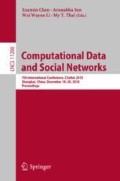Abstract
For network scientists, it has always been an interesting problem to identify the influential nodes in a given network. K-shell decomposition method is a widely used method which assigns a shell-index value to each node based on its influential power. K-shell method requires the entire network to compute the shell-index of a node that is infeasible for large-scale real-world dynamic networks. In the present work, first, we show that the shell-index of a node can be estimated using its \(h^2-index\) which can be computed using local neighborhood information. We further show that \(h^2-index\) has better monotonicity and correlation with the spreading power of the node than the shell-index. Next, we propose hill-climbing based methods to identify top-ranked nodes in a small number of steps. We further propose a heuristic method to estimate the percentile rank of a node without computing influential power of all the nodes.
Access this chapter
Tax calculation will be finalised at checkout
Purchases are for personal use only
References
Seidman, S.B.: Network structure and minimum degree. Soc. Netw. 5(3), 269–287 (1983)
Kitsak, M., et al.: Identification of influential spreaders in complex networks. Nat. Phys. 6(11), 888–893 (2010)
Saxena, A., Iyengar, S.R.S., Gupta, Y.: Understanding spreading patterns on social networks based on network topology. In: 2015 IEEE/ACM International Conference on Advances in Social Networks Analysis and Mining (ASONAM), pp. 1616–1617. IEEE (2015)
Zeng, A., Zhang, C.-J.: Ranking spreaders by decomposing complex networks. Phys. Lett. A 377(14), 1031–1035 (2013)
Liu, J.-G., Ren, Z.-M., Guo, Q.: Ranking the spreading influence in complex networks. Phys. A Stat. Mech. Appl. 392(18), 4154–4159 (2013)
Basaras, P., Katsaros, D., Tassiulas, L.: Detecting influential spreaders in complex, dynamic networks. Computer 46(4), 0024–29 (2013)
Bae, J., Kim, S.: Identifying and ranking influential spreaders in complex networks by neighborhood coreness. Phys. A Stat. Mech. Appl. 395, 549–559 (2014)
Tatti, N., Gionis, A.: Density-friendly graph decomposition. In: Proceedings of the 24th International Conference on World Wide Web, pp. 1089–1099. International World Wide Web Conferences Steering Committee (2015)
Lü, L., Zhou, T., Zhang, Q.-M., Stanley, H.E.: The H-index of a network node and its relation to degree and coreness. Nat. Commun. 7 (2016)
Leskovec, J., Kleinberg, J., Faloutsos, C.: Graph evolution: densification and shrinking diameters. ACM Trans. Knowl. Discov. Data (TKDD) 1(1), 2 (2007)
Zafarani, R., Liu, H.: Social computing data repository at ASU (2009)
Yang, J., Leskovec, J.: Defining and evaluating network communities based on ground-truth. Knowl. Inf. Syst. 42(1), 181–213 (2015)
Hogg, T., Lerman, K.: Social dynamics of digg. EPJ Data Sci. 1(1), 1–26 (2012)
Klimt, B., Yang, Y.: The Enron corpus: a new dataset for email classification research. In: Boulicaut, J.-F., Esposito, F., Giannotti, F., Pedreschi, D. (eds.) ECML 2004. LNCS (LNAI), vol. 3201, pp. 217–226. Springer, Heidelberg (2004). https://doi.org/10.1007/978-3-540-30115-8_22
Viswanath, B., Mislove, A., Cha, M., Gummadi, K.P.: On the evolution of user interaction in facebook. In: Proceedings of the 2nd ACM Workshop on Online Social Networks, pp. 37–42. ACM (2009)
Cho, E., Myers, S.A., Leskovec, J.: Friendship and mobility: user movement in location-based social networks. In Proceedings of the 17th ACM SIGKDD International Conference on Knowledge Discovery and Data Mining, pp. 1082–1090. ACM (2011)
Gupta, Y., Das, D., Iyengar, S.R.S.: Pseudo-cores: the terminus of an intelligent viral meme’s trajectory. In: Cherifi, H., Gonçalves, B., Menezes, R., Sinatra, R. (eds.) Complex Networks VII. SCI, vol. 644, pp. 213–226. Springer, Cham (2016). https://doi.org/10.1007/978-3-319-30569-1_16
Saxena, A., Iyengar, S.R.S.: Global rank estimation. arXiv preprint arXiv:1710.11341 (2017)
Saxena, A., Malik, V., Iyengar, S.R.S.: Rank me thou shalln’t compare me. arXiv preprint arXiv:1511.09050 (2015)
Saxena, A., Gera, R., Iyengar, S.R.S.: Observe locally rank globally. In: Proceedings of the 2017 IEEE/ACM International Conference on Advances in Social Networks Analysis and Mining 2017, pp. 139–144. ACM (2017)
Saxena, A., Gera, R., Iyengar, S.R.S.: Estimating degree rank in complex networks. Soc. Netw. Anal. Min. 8(1), 42 (2018)
Saxena, A., Gera, R., Iyengar, S.R.S.: Fast estimation of closeness centrality ranking. In: Proceedings of the 2017 IEEE/ACM International Conference on Advances in Social Networks Analysis and Mining 2017, pp. 80–85. ACM (2017)
Saxena, A., Gera, R., Iyengar, S.R.S.: A faster method to estimate closeness centrality ranking. arXiv preprint arXiv:1706.02083 (2017)
Moré, J.J.: The Levenberg-Marquardt algorithm: implementation and theory. In: Watson, G.A. (ed.) Numerical Analysis. LNM, vol. 630, pp. 105–116. Springer, Heidelberg (1978). https://doi.org/10.1007/BFb0067700
Author information
Authors and Affiliations
Corresponding author
Editor information
Editors and Affiliations
Rights and permissions
Copyright information
© 2018 Springer Nature Switzerland AG
About this paper
Cite this paper
Saxena, A., Iyengar, S.R.S. (2018). K-Shell Rank Analysis Using Local Information. In: Chen, X., Sen, A., Li, W., Thai, M. (eds) Computational Data and Social Networks. CSoNet 2018. Lecture Notes in Computer Science(), vol 11280. Springer, Cham. https://doi.org/10.1007/978-3-030-04648-4_17
Download citation
DOI: https://doi.org/10.1007/978-3-030-04648-4_17
Published:
Publisher Name: Springer, Cham
Print ISBN: 978-3-030-04647-7
Online ISBN: 978-3-030-04648-4
eBook Packages: Computer ScienceComputer Science (R0)

